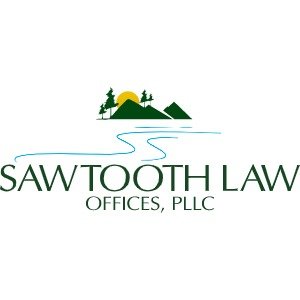Best Tax Increment Financing Lawyers in Boise
Share your needs with us, get contacted by law firms.
Free. Takes 2 min.
List of the best lawyers in Boise, United States
About Tax Increment Financing Law in Boise, United States
Tax Increment Financing (TIF) is a public financing method used by municipalities like Boise to promote economic development and urban renewal. It involves redirecting the future property tax revenue increases that result from the rise in property values in predefined "TIF districts" to fund current infrastructure and redevelopment projects. These districts are designated areas within which the TIF funds are utilized, and the approach aims to stimulate investment that may not occur without such incentives. In Boise, TIF has been applied to revitalize areas with potential for economic growth, spurring construction projects, and improving public amenities.
Why You May Need a Lawyer
Engaging with Tax Increment Financing can be complex, and there are several scenarios where consulting a lawyer might be beneficial, including:
- Understanding TIF Proposals: Navigating the complexities of TIF proposals can be challenging. A lawyer can help decipher the financial and legal impacts.
- Negotiating TIF Agreements: Lawyers can aid in negotiating terms to ensure that agreements align with your interests and comply with legal standards.
- Resolving Disputes: Legal disputes may arise between developers, municipalities, or other stakeholders, requiring legal expertise to resolve.
- Compliance and Regulation: Lawyers can help ensure compliance with local bylaws, zoning laws, and other regulations.
Local Laws Overview
In Boise, the implementation of TIF is governed by a combination of state and local laws. Key aspects include:
- Idaho Urban Renewal Law: This state law provides the framework for establishing urban renewal agencies and authorizes the use of TIF.
- TIF District Designation: An area must be officially designated as a TIF district before financing can occur, usually requiring local government approval.
- Revenue Allocation Area (RAA): The creation of RAAs is critical to the TIF process, defining where the increment in tax revenue will be applied.
- Public-Private Partnerships: Collaboration between the city and private entities is often necessary for TIF projects.
Frequently Asked Questions
What is the purpose of Tax Increment Financing?
Its purpose is to stimulate economic development in underdeveloped or blighted areas by funding improvements that will increase property values.
How is a TIF district created in Boise?
A TIF district is established through designation by the local government, which requires public hearings and approval of a redevelopment plan.
Who benefits from TIF in Boise?
Both the public and private sectors benefit. Developers and businesses can access needed funds, while the community gains improved infrastructure and services.
Can any area be designated as a TIF district?
No, an area must meet specific criteria related to its potential for redevelopment and improvement.
Are TIF funds considered a loan that must be repaid?
No, TIF funds are not loans; they are an investment using anticipated tax revenue increases from the project.
How long does a TIF district remain in effect?
The duration varies, but it typically spans around 20 to 30 years, depending on the project's scope and municipal goals.
Can small businesses benefit from TIF?
Yes, TIF can support small businesses by enhancing the local infrastructure and making the area more attractive for commerce.
Are there risks associated with TIF for municipalities?
Yes, if the projected increase in property values fails to materialize, the expected revenue may not be sufficient to cover the expenses.
How does TIF affect my property taxes?
TIF does not increase taxes; it reallocates the way future tax revenue is used.
Can TIF be used for residential development?
Yes, TIF can support mixed-use projects that include residential components.
Additional Resources
For those seeking more information, the following resources and organizations might be helpful:
- Idaho Department of Commerce
- Boise City Urban Renewal Agency
- Boise Regional REALTORS
- West Central Mountains Economic Development Council
- Local Urban Planning Offices
Next Steps
If you are considering involvement in a TIF project or need legal assistance in Boise, consider the following steps:
- Consult with a lawyer specialized in municipal and tax law in Boise for personalized advice.
- Investigate the specific requirements and potential for TIF in your area by contacting local planning offices.
- Attend public meetings or hearings related to TIF projects to stay informed.
- Review any existing TIF agreements and district designations that may affect your interests.
Engaging with knowledgeable professionals and local authorities can ensure that you are well-prepared to navigate the complexities of Tax Increment Financing in Boise.
Lawzana helps you find the best lawyers and law firms in Boise through a curated and pre-screened list of qualified legal professionals. Our platform offers rankings and detailed profiles of attorneys and law firms, allowing you to compare based on practice areas, including Tax Increment Financing, experience, and client feedback.
Each profile includes a description of the firm's areas of practice, client reviews, team members and partners, year of establishment, spoken languages, office locations, contact information, social media presence, and any published articles or resources. Most firms on our platform speak English and are experienced in both local and international legal matters.
Get a quote from top-rated law firms in Boise, United States — quickly, securely, and without unnecessary hassle.
Disclaimer:
The information provided on this page is for general informational purposes only and does not constitute legal advice. While we strive to ensure the accuracy and relevance of the content, legal information may change over time, and interpretations of the law can vary. You should always consult with a qualified legal professional for advice specific to your situation.
We disclaim all liability for actions taken or not taken based on the content of this page. If you believe any information is incorrect or outdated, please contact us, and we will review and update it where appropriate.













